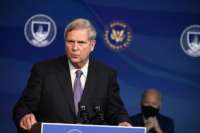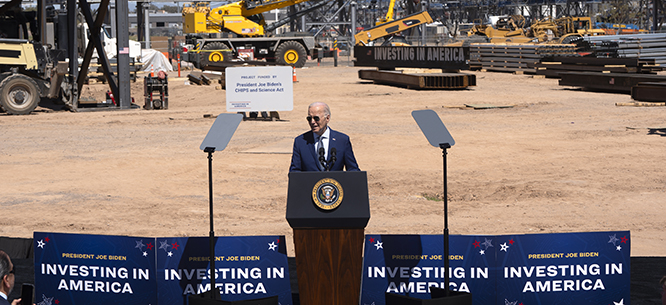
President Joe Biden has expressed an interest in leading the United States back into the Trans-Pacific Partnership (TPP), the multilateral trade agreement finalized in 2016 that has been widely criticized by labor unions and environmental groups. If Biden does pursue that policy, his nominee for Secretary of Agriculture, Tom Vilsack, will likely help lead the charge.
During his confirmation hearing earlier this month, Vilsack, who was Secretary of Agriculture for eight years under President Barack Obama, vowed to “provide advice and counsel and directions to try to look at additional free trade agreements that could be negotiated during the course of the Biden administration.” In 2019, while head of a trade association called the U.S. Dairy Export Council, Vilsack lamented the Trump administration’s decision to pull the U.S. out of the TPP, in an interview with C-SPAN, and urged the administration to pursue a free trade agreement with Japan, a TPP member that has repeatedly called on the U.S. to rejoin the agreement since former President Donald Trump withdrew from it in January 2017.
Later, in the same interview, Vilsack said U.S. trade negotiators should seek closer trade ties with countries around the world, including another TPP member, Malaysia, which was the subject of controversy during initial TPP negotiations because of the country’s failure to crack down on human trafficking.
In 2015, Congress passed a law barring countries from fast-tracked trade negotiations if they had the lowest grade on the State Department’s annual report on human trafficking. Congress has constitutional authority over treaty ratification and must relinquish this power to the president in order for multilateral trade deals to be hashed out among national trade delegations. The Obama administration responded to the legal restrictions by upgrading Malaysia’s ratings on the so-called Trafficking in Persons report without citing evidence that the country’s approach to human trafficking had changed in any way.
“The upgrade follows international scrutiny and outcry over Malaysian efforts to combat human trafficking after the discovery this year of scores of graves in people-smuggling camps near its northern border with Thailand,” as Reuters noted at the time.
Moves to integrate the U.S. economy more closely with countries that have lower labor standards primarily benefit corporate managers and shareholders, which is essentially the point of the TPP. Dean Baker, co-founder of the Center for Economic and Policy Research, said the deal actually has “nothing to do with free trade” because the U.S. already had free trade agreements with several TPP members before negotiations started, and much of the agreement would actually restrict commerce by strengthening rules on intellectual property.
“One of the stronger items in the deal is on patent protections,” Baker said. “That would mean higher drug prices, and higher prices for other items that get patent and copyright protection.”
U.S. participation in the TPP was initially spearheaded by President George W. Bush in 2008, late in his second term. President Obama ratcheted up the talks over the deal, which was finalized in 2016. Days after Donald Trump was inaugurated in 2017, Trump pulled the U.S. out of the TPP — just like his opponent in the 2016 election, Hillary Clinton, had promised to do in response to strong opposition to the deal from core Democratic Party constituents, including environmental activists and labor organizers.
Although President Biden pledged to work hand-in-hand with labor unions, he has expressed an interest in rejoining the agreement. During the most recent presidential campaign, in 2019, he told the Council on Foreign Relations that “the idea behind it was a good one,” claiming that the TPP set “high standards for workers, [and] the environment” and could be a useful cudgel against China.
Biden also told the Council on Foreign Relations that he wouldn’t sign a trade deal without “strong protections for our workers,” but he’s already backing down from another campaign pledge to labor: a $15 federal minimum wage.
After the U.S. left the TPP, amendments pushed by the Obama administration were stripped from the agreement, which was rebranded as the Comprehensive and Progressive Trans Pacific Partnership. Despite the new name, organized labor and environmental observers have continued to decry the framework as a boon for capital at the expense of workers and the planet. In testimony before the Senate last December, United Steelworkers legislative director Roy Houseman urged Biden to refrain from rejoining TPP by justifying the move as a counterweight against China, noting that the TPP would still allow the free flow of many Chinese goods to U.S. markets. The trade agreement also contains no binding language on labor standards, as noted recently by the Trade Unions Congress, the U.K.’s largest union confederation. (The British government expressed an interest in joining the TPP in late January, after its departure from the EU and the European Union Customs Union.)
On the environmental front, Australian academic Matthew Rimmer described the TPP’s environmental provisions as “greenwashing” for their lack of enforcement mechanisms, saying that the agreement weakens “effective and meaningful government action and regulation.” Environmentalist groups in the U.S., such as Friends of the Earth and 350.org, have also lambasted the TPP for strengthening the position of fossil fuel companies, and for doing nothing to address climate change.
But for agricultural interests, the TPP, might be an easy sell. Agriculture is one of the few sectors of the U.S. economy that has run trade surpluses in recent years, despite trade liberalization causing commodity production to shift toward jurisdictions with minimal labor, workplace and environmental regulations — a phenomenon that has been described by economists as a “race to the bottom.” This isn’t to say that free trade has benefited farm workers or small farmers. Power in the agricultural industry is highly concentrated in the hands of a few multinational corporations, and many farm laborers in the U.S. migrate seasonally from Mexico, where small-scale agricultural production was decimated after the implementation of the North American Free Trade Agreement in 1994.
In Vilsack, agricultural conglomerates have someone who won’t shy away from fighting for them, just as he did when he was Secretary of Agriculture under Obama. During that time, Vilsack oversaw an increase in monopoly power in the meat industry, and the whittling down of food and safety regulations for poultry processing facilities down rules mandating that genetically modified foods be labeled as such. (The rules won’t be in full effect until January 2022.) And with Vilsack at the helm, the U.S. Department of Agriculture (U.S.D.A.) manipulated data to make it seem like his record on civil rights was better than it actually was, as an investigation by the food watchdog The Counter discovered in 2019.
“Under Vilsack, U.S.D.A. employees foreclosed on Black farmers with outstanding discrimination complaints, many of which were never resolved,” The Counter said. “At the same time, U.S.D.A. staff threw out new complaints and misrepresented their frequency, while continuing to discriminate against farmers. The department sent a lower share of loan dollars to Black farmers than it had under President Bush, then used census data in misleading ways to burnish its record on civil rights.”
Vilsack also succumbed to racist propaganda in 2010, by firing then-USDA rural development leader Shirley Sherrod in response to a disinformation campaign led by now-deceased far-right blogger Andrew Breitbart. Not long after, Vilsack apologized for firing Sherrod and offered to rehire the former civil rights leader from Georgia. Sherrod declined Vilsack’s offer.
The decision to renominate Vilsack also angered civil rights leaders because Biden passed over Marcia Fudge, a Black former congresswoman from Ohio who was vying for the position after spending several years on the House Agriculture Committee advocating for the USDA to do more to fight hunger. Fudge, who was nominated as the Secretary of Housing and Urban Development as a consolation prize, opposed the TPP.
Vilsack was also nominated as Secretary of Agriculture again despite asking President Obama in 2015 for permission to resign from the role because he was bored with the job, telling The Washington Post: “there are days when I have literally nothing to do.”
The former Iowa governor might find himself busier this time around, should the administration enlist him in a push to strike new trade deals. The USDA office has an office called the Foreign Agricultural Service that works with the U.S. Trade Representative “and the private sector in a coordinated effort to negotiate trade agreements,” in the words of the agency. Vilsack will also likely have the opportunity later this year to lobby Congress on behalf of free trade agreements. With presidential fast-track authority set to expire on July 1, agricultural lobbyists are already pushing the administration to seek out trade agreements, including the TPP.
Vilsack has not yet been confirmed, but his nomination looks set for a vote next week, as early as Tuesday. The Senate will likely approve his appointment without much fuss, as its agriculture committee voted unanimously to advance his nomination to a full floor vote hours after his confirmation hearing, which Politico described as “overwhelmingly friendly.”
This post was originally published on Latest – Truthout.

